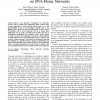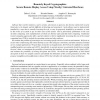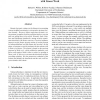70 search results - page 2 / 14 » How Security Problems can Compromise Remote Internet Voting ... |
CCS
2007
ACM
13 years 12 months ago
2007
ACM
Low-latency anonymity systems such as Tor, AN.ON, Crowds, and Anonymizer.com aim to provide anonymous connections that are both untraceable by “local” adversaries who control ...
CRISIS
2009
13 years 3 months ago
2009
IPv6 is an attractive technology for innovative services such as health care monitoring, alarm systems, peer to peer applications, virtual machine systems and so on. The generaliza...
ICICS
2005
Springer
13 years 11 months ago
2005
Springer
Software that covertly monitors a user’s actions, also known as spyware, has become a first-level security threat due to its ubiquity and the difficulty of detecting and remov...
IEEEARES
2007
IEEE
14 years 2 days ago
2007
IEEE
Remote electronic voting over the Internet is a promising concept to afford convenience to voters and to increase election turnouts. However, before employing electronic voting sy...
CLUSTER
2002
IEEE
13 years 10 months ago
2002
IEEE
A practical problem faced by users of metacomputers and computational grids is: If my computation can move from one system to another, how can I ensure that my data will still be ...



